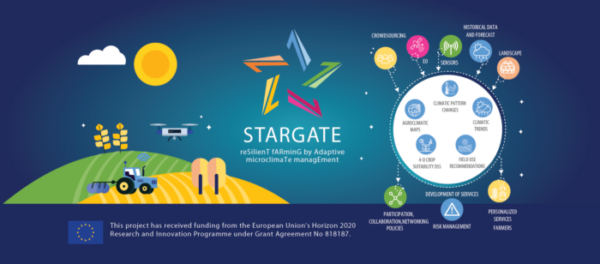 Climate change’s negative impacts are already being felt on farms, but the problem also works in reverse as agriculture is a major part of the climate problem currently generating over 20% of total greenhouse gas emissions.
Climate change’s negative impacts are already being felt on farms, but the problem also works in reverse as agriculture is a major part of the climate problem currently generating over 20% of total greenhouse gas emissions.
STARGATE research project develops a breakthrough, multiscale and holistic climate-smart agriculture (CSA) methodology, capitalizing innovations in the field of microclimate and weather risk management, as well as in the field of landscape design.
STARGATE is based on earth observation, weather intelligence and IoT technologies to support effective farm management and related options for adaptation to climatic changes, local and regional policy formulation leading to better landscape management.
The project implements the Living Lab approach by connecting research organizations, policy-making organizations, ICT companies, farmers and other stakeholders to shape a CSA multi-actor regional framework. Moreover, STARGATE studies the benefits of applying agri-environmental-climate technical solutions to achieve sustainable agricultural development at the field and landscape level including livestock farming and agroforestry. STARGATE is leveraging access to these data and climate-smart decisions tools to foster easy and affordable adoption by farm management and policymaking bodies.
Furthermore, STARGATE provides innovative components for the visualization of big data with an emphasis on geospatial visualization and dynamic charting. Additionally, the project has been designed so that its results may be further developed in other projects, or adapted to broader contexts, providing opportunities for influencing policies.
The project is well in symphony with the required actions to support sustainable agriculture, and resilient agricultural management and will run until September 2023 involving 26 partners from Greece, Czech Republic, Israel, Spain, Latvia, Switzerland, Austria, Italy, Portugal, Poland, Germany, Norway, and Belgium.
For further information visithttps://www.stargate-h2020.eu and/or contact Professor Dimitrios Moshou ([email protected]).

